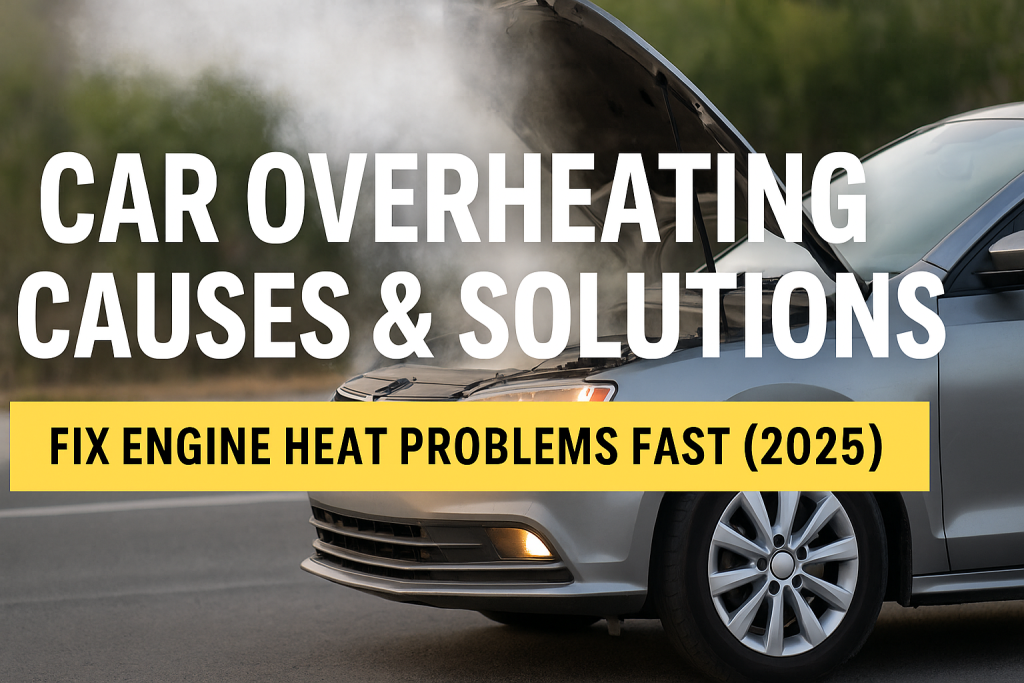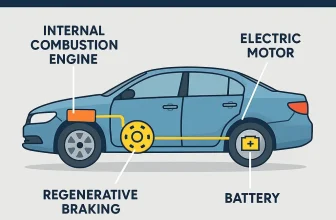Introduction: Car Overheating Causes You Shouldn’t Ignore

Car overheating causes serious concern among vehicle owners and should never be taken lightly. An overheating engine can lead to warped cylinder heads, blown gaskets, and complete engine failure. Whether your car overheats occasionally or frequently, identifying the exact reason is essential to avoid costly repairs.
This in-depth guide outlines the most common causes of engine overheating, symptoms to watch out for, and preventive measures every car owner should adopt. Our goal is to empower you to take the right steps, saving both your engine and your wallet.
Symptoms of Car Overheating
Recognizing the symptoms of an overheating engine is the first step toward solving the problem. Look for the temperature gauge moving into the red zone, steam escaping from under the hood, or an unusually hot smell.
You may also experience a drop in engine performance or hear knocking sounds. In modern vehicles, a warning light or ‘limp mode’ may activate to protect the engine. Being aware of these signs can prevent further damage and allow you to act quickly.
Low Coolant Levels
Coolant, also known as antifreeze, plays a crucial role in absorbing and dissipating engine heat. If your coolant level is too low, the system cannot regulate the temperature effectively, leading to overheating.
Coolant may leak due to worn hoses, a damaged radiator, or a faulty water pump. It’s important to check the coolant reservoir regularly, especially before long trips. Low coolant is among the most common and easily preventable car overheating causes.
Radiator Issues
The radiator is responsible for expelling heat from the coolant before it recirculates back into the engine.
When the radiator becomes clogged with debris, rust, or mineral deposits, it loses its ability to cool the fluid efficiently.
Signs of radiator issues include discolored coolant, overheating at high speeds, and visible corrosion. A periodic radiator flush and inspection for leaks or bent fins can help maintain optimal performance.
Broken Radiator Fan
Radiator fans are essential for cooling when your car is stationary or moving slowly. If the fan motor fails or the relay switch malfunctions, the radiator will not be cooled properly, especially during traffic or stop-and-go driving.
To test the fan, turn on your air conditioning and listen for fan activity. If there is no sound, the fan or its electrical connections may need repair.
Stuck Thermostat
The thermostat controls the flow of coolant based on engine temperature. When it becomes stuck in the closed position, it prevents coolant from reaching the radiator, causing the engine to overheat quickly.
Common symptoms include rapid temperature spikes and the absence of warm air from the heater. Replacing a thermostat is relatively affordable and can restore the normal cooling cycle.
Water Pump Failure
The water pump is the heart of the cooling system, responsible for circulating coolant throughout the engine.
If the pump fails, coolant flow stops, resulting in immediate overheating. Look for signs like coolant leakage near the engine’s front, high-pitched noises, or engine overheating regardless of driving speed.
Water pumps should be replaced at regular intervals, often alongside the timing belt.
Air Pockets in Cooling System
Air pockets or bubbles can form during a coolant change or from a leaking head gasket.
These bubbles disrupt the continuous flow of coolant and can cause hot spots in the engine. Gurgling noises, fluctuating temperature readings, and inconsistent heater output are signs of air in the system.
Properly bleeding the system is necessary to remove trapped air and restore normal operation.
Overheating with AC On
Using the air conditioner adds strain to the engine, and if the cooling system isn’t functioning properly, this extra load can tip it into overheating.
Common indicators include rising temperature when the AC is on, and the engine returning to normal when it’s turned off.
Cleaning the AC condenser, ensuring adequate airflow, and checking fan operation can resolve this issue.
Bad Radiator Cap
Often overlooked, the radiator cap maintains the system’s pressure and prevents coolant from boiling over.
If the cap is damaged or worn out, it can allow coolant to escape or fail to build proper pressure, leading to overheating.
Caps are inexpensive and easy to replace, making them a good starting point for diagnostics.
What to Do When Your Car Overheats
If your car begins to overheat, take immediate action to prevent engine damage:
- Turn off the air conditioner to reduce strain.
- Turn on the heater to help draw heat from the engine.
- Pull over safely and shut off the engine.
- Open the hood after the engine cools down to release trapped heat.
- Check the coolant level once it’s safe and refill if necessary.
- Do not continue driving if the engine is still hot — call for roadside assistance or a tow.
Prevention Tips to Avoid Car Overheating Causes
Preventing car overheating is easier and more cost-effective than repairing engine damage. To avoid common car overheating causes, make routine checks a habit. Start by inspecting your coolant level monthly and topping it off with the correct fluid type. Flush the cooling system every 2 to 3 years to prevent buildup and blockages.
Ensure radiator fans function properly, especially in traffic or hot climates. Examine hoses and belts for cracks or wear, as leaks often lead to rapid coolant loss. Replace your thermostat and water pump at manufacturer-recommended intervals, as both are frequent car overheating causes when they fail.
Also, clean debris from the radiator and condenser to maintain airflow. On hot days, don’t overload your vehicle or run the AC excessively during stop-and-go driving.
By taking these preventive steps, you’ll significantly reduce your risk of engine overheating and extend the life of your vehicle — while avoiding the most common car overheating causes on the road.
Frequently Asked Questions (FAQ)
1. Why is my car overheating even though the coolant is full?
If your coolant level is fine but the engine still overheats, the issue may be with a stuck thermostat, failing water pump, air pockets, or a clogged radiator. Also, check if the radiator fan is working — without airflow, heat won’t dissipate properly.
2. Is it safe to drive a car that’s overheating?
No. Driving an overheating car can lead to severe engine damage, including warped cylinder heads or a blown head gasket. If the temperature gauge is in the red or you see steam, pull over immediately, shut off the engine, and wait for it to cool before checking anything.
3. What should I do immediately when my car overheats?
- Turn off the air conditioner
- Turn on the cabin heater
- Pull over safely and shut off the engine
- Open the hood carefully after cooling
- Check coolant levels and look for visible leaks
If unsure, call for roadside assistance to avoid further damage.
4. Can low oil cause the engine to overheat?
Yes, low engine oil can lead to overheating. Oil lubricates internal parts and helps with heat dissipation. If oil is low, friction increases, which raises engine temperature. Check oil level regularly alongside coolant.
5. Why does my car overheat only in traffic or when idling?
This usually points to a faulty radiator fan, fan switch, or fan relay. When you’re moving, airflow cools the radiator. But when stopped, the fan must kick in. If it doesn’t, heat builds up rapidly.
6. How often should I change my coolant to prevent overheating?
Most vehicles need a coolant flush every 2–3 years or every 30,000 to 60,000 miles, depending on the manufacturer and the type of coolant. Old coolant can become acidic, lose its boiling point protection, and cause internal corrosion.
7. Can a bad radiator cap really cause overheating?
Absolutely. A worn or weak radiator cap can’t hold proper pressure, which lowers the coolant’s boiling point. This leads to overflow or boiling, even if the system is otherwise fine. It’s a cheap fix that often gets overlooked.
8. How do I know if my thermostat is stuck closed?
If the engine heats up rapidly, the heater blows cold air, and there’s no coolant flow visible in the radiator (when warm), your thermostat may be stuck. Replacing it is essential to restore coolant circulation.
9. Can using the AC make my car overheat?
Yes, especially if your cooling system is weak. The AC system adds load to the engine, and if the radiator fan or condenser is dirty or failing, temperatures can spike. If the temp rises only with AC on, check the fan and clean the condenser.
10. How can I prevent my car from overheating in hot weather?
- Check coolant and oil levels before driving
- Park in shade or use a windshield sunshade
- Avoid heavy AC use uphill or in traffic
- Inspect your fan and radiator regularly
- Don’t overload your vehicle




